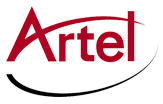Video and Networking Courses for Professionals

Service Details
Technology changes quickly and the migration towards IP and the convergence of video and IT ecosystems requires broadcast professionals to understand networking and for networking professionals to understand broadcast. Artel’s training programs are designed with the objective of aiding today’s broadcast and networking professionals as they navigate towards and prepare for the industry’s transition to IP.
Artel’s Technology Training Programs for Video and IT Professionals offer top-notch courses developed by experts in the field. They are designed to accelerate an understanding of the underlying technologies needed in today’s broadcast industry migration to IP and to facilitate productivity in this new environment.
Technology Training Course Descriptions:
Video Technology for Networking Professionals I (VidL1)
Video and audio streams differ significantly from the data flows found on most IP networks. Their high bandwidths, intricate timing requirements and complex makeup are critical to understand as network traffic loads become increasingly dominated by video content. This course is designed specifically for practicing professionals who have a strong background in IP networking and who are seeking to understand audio and video signal formats and terminology. After completing this course, students will understand a wide range of video signal types and the systems that are used to distribute them to viewers.
Video Technology for Networking Professionals II (VidL2)
As they move from source to the ultimate viewer, video signals undergo many types of transformations. Two of the most important ones for networking professionals to understand are compression and containerization. Compression technology has a significant impact on the size of video files and the amount of bandwidth consumed, but if done incorrectly, it can result in signals that are essentially unwatchable. A wide variety of specialized container formats are used for video and audio files and streams; the ability to work with these formats is essential for successfully deploying video networks. This course will enable students to understand the key technologies used in modern compression, and to become familiar with the file/stream formats used throughout today’s media industries.
Networking Technology for Video Professionals I (NetL1)
The ability to understand and work effectively with IP networking technology is becoming a required skill at every technical level within a modern broadcast facility. This course is designed for engineers, technicians and operators who need to become familiar with the functions and terminologies that will be used to create the next generation of video production systems. Fundamental technologies such as Ethernet, IP, TCP and HTTP are covered as they relate specifically to high-reliability, high bandwidth video and audio signal transport. Key network functions, including switching, routing, and consumer IP video delivery are explained using diagrams and examples taken directly from modern media networks. After completing this course, students will have a solid introduction to modern data networking technologies as they apply to a wide range of media applications.
Networking Technology for Video Professionals II (NetL2)
This course is designed to build on a foundation of basic IP networking knowledge in order to focus on more advanced technologies that are needed for IP video production. Multicasting is covered in detail, in recognition of its crucial role within video and audio studios. Transmission technologies that go beyond wired Ethernet are discussed due to their widespread use in media signal collection and distribution. Video encapsulation is covered in depth, including the packet formats that are used to carry video and audio signals across IP networks with minimal errors. In contrast with general-purpose data networking courses, this course provides focused learning of key technologies that are widely used in media networks without asking students to wade through hours of other unrelated topics.
Modern IP Video Technologies and Systems (IPVid)
With the tremendous onslaught of new standards that have recently been released for media production and transport, there is a huge amount of new technology that will be revolutionizing media production systems. This course is designed specifically to address the needs of technicians and engineers with backgrounds in both video and networking technologies who need to learn about these cutting-edge developments. All of the latest specifications and standards from the VSF and SMPTE are covered, including ones still in development. Network and signal performance requirements are discussed along with performance measurement and network troubleshooting tools. After completing this course, students will be up-to-date with the latest developments in media networking and production.
Fiber Optic Fundamentals
Contact Artel for additional information.
